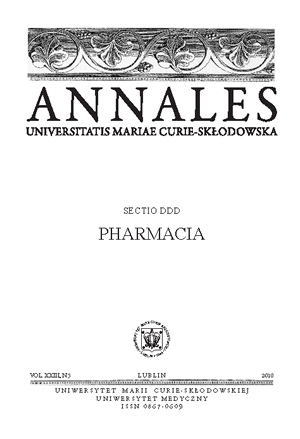Synteza nowych 4-azolidynonów z cząsteczką 3,5-diaryl-4,5-dihydropirazolu i ocena ich aktywności przeciwnowotworowej in vitro
Słowa kluczowe:
4-azolidynony, 3,5-diaryl-4,5-dihydropirazole, acylacja, alkilacja, spektra 1H NMR, aktywność przeciwnowotworowaAbstrakt
W pracy opisano proces syntezy nowego 4-azolidonu z podstawnikiem pirazolinowym. Zgodnie z protokołem NCI przebadano sześć uzyskanych substancji, przy czym dwie z nich (4d, 4e) wykazały aktywność przeciwnowotworową w stosunku do linii komórkowych białaczki, czerniaka, raka płuc, okrężnicy, OUN, jajników, nerek, prostaty i piersi.
Bibliografia
1. Abadi A.H. et al.: Synthesis of novel 1,3,4-trisubstituted pyrazole derivatives and their evaluation as antitumor and antiangiogenic agents. Chem. Pharm. Bull., 51, 838, 2003.
2. Beswick M.C. et al.: 3-(2-Hydroxy-phenyl)-1H-pyrazole-4-carboxylic acid amide derivatives as HSP90 inhibitors for the treatment of cancer. US 2007/0112192.
3. Carter P. H. et al.: Photochemically enhanced binding of small molecules to the tumor necrosis factor receptor-1 inhibits the binding of TNF-alpha. Proc. Natl. Acad. Sci. USA, 98, 11879, 2001.
4. Cutshall N. S. et al.: Rhodanine derivatives as inhibitors of JSP-1. Bioorg. Med. Chem. Lett., 15, 3374, 2005.
5. Dayam R. et al.: Discovery of small molecule integrin αvβ3 antagonists as novel anticancer agents. J. Med. Chem., 49, 4526, 2006.
6. Degterev A. et al.: Identification of small-molecule inhibitors of interaction between the BH3 domain and Bcl-xL. Nature Cell. Biol., 3, 173, 2001.
7. Havrylyuk D. et al.: Synthesis of novel thiazolone-based compounds containing pyrazoline moiety and evaluation of their anticancer activity. Eur. J. Med. Chem., 44, 1396, 2008.
9. Kaminskyy D., Zimenkovsky B., Lesyk R.: Synthesis and in vitro anticancer activity of 2,4-azolidinedione-acetic acids derivatives. Eur. J. Med. Chem., 44, 3627, 2009.
10. Lin R. et al.: Design, synthesis, and evaluation of 3,4-disubstituted pyrazole analogues as anti-tumor CDK inhibitors. Bioorg. Med. Chem. Lett., 17, 4557, 2007.
11. Manna F. et al.: Synthesis of some pyrazole derivatives and preliminary investigation of their affinity binding to P-glycoprotein. Bioorg. Med. Chem. Lett., 15, 4632, 2005.
12. Palaska E. et al.: Synthesis and antidepressant activities of some 3,5-diphenyl-2-pyrazolines. Eur. J. Med. Chem., 36, 539, 2001.
13. Popov-Pergal К. et al.: Condensation of 2,4-dioxotetrahydro-1,3-thiazole with aromatic aldehydes. J. Gen. Chem. USSR, 61, 1958, 1991.
14. Shoemaker R. H.: The NCI60 human tumour cell line anticancer drug screen. Nature Rev. Cancer, 6, 813, 2006.
15. Zimenkovskii B.S. et al.: Synthesis and antimicrobial activity of 2,4-dioxothiazolidine-5-acetic acid amides. Pharm.Chem. J., 40, 303, 2006.
Pobrania
Opublikowane
Numer
Dział
Licencja
Prawa autorskie (c) 2010 Autorzy

Praca jest udostępniana na licencji Creative Commons Attribution-NonCommercial-NoDerivatives 3.0 Unported License.


